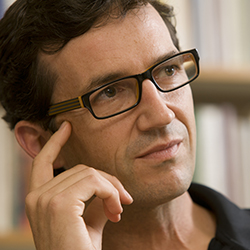Peter A. Ubel M.D.
 Madge and Dennis T. McLawhorn University Professor
Madge and Dennis T. McLawhorn University Professor
Associate Director of Health Sector Management
Professor of Public Policy and Business Administration
Duke University
Email: peter.ubel@duke.edu
Discipline: Psychology, Medicine
Investigator Award 
Emotional Adaptation and the Goals of Health Care PolicyAward Year: 2007 Researchers have shown that people can adapt emotionally to a wide range of adverse circumstances. But predictions about how fully people will or will not adapt to serious illness and disability, either physical or mental, are often wrong. For example, people with quadriplegia report moods and quality of life that are similar to those reported by people who are healthy, and exceed what healthy people believe their moods and quality of life would be if they were to become quadriplegic. How do these beliefs affect the choices made when patients seek treatments for illnesses, when payers determine coverage policies, and when policymakers weigh programmatic or financing options? What role should well-being play in determining health care priorities, and how should policies that aim to maximize health address conditions where improving physical functioning and well-being do not go hand in hand? Peter A. Ubel, M.D. examines these complicated questions in his project, Emotional Adaptation and the Goals of Health Care Policy. This study attempts to break new ground by introducing insights from well-being research to debates about the cost-effectiveness of medical treatments, coverage decisions by payers, and discussions about health care priorities in the United States.
Background 
Peter A. Ubel is the associate director of Health Sector Management as well as the Madge and Dennis T. McLawhorn University Professor at the Fuqua School of Business and professor of public policy in the Sanford School of Public Policy at Duke University. Previously, he was the George C. Dock Collegiate Professor of Medicine and professor of psychology at the University of Michigan, co-director of the University of Michigan Robert Wood Johnson Clinical Scholars Program, and director of the Center for Behavioral and Decision Sciences in Medicine at the University of Michigan. His research explores controversial issues about the role of values and preferences in health care decision-making, from decisions at the bedside to policy decisions. He uses the tools of decision psychology and behavioral economics to explore topics like informed consent, shared decision-making and health care rationing. Dr. Ubel has won many research awards, including a Presidential Early Career Award for Scientists and Engineers from President Clinton in 2000. He has published articles for lay audiences in places like The New York Times, The Los Angeles Times, The New Leader and The Huffington Post. He has significant experience communicating his research findings to broad audiences on radio and television, including guest appearances on Talk of the Nation, Fresh Air, and All Things Considered. He is author of Pricing Life: Why it is time for health care rationing (MIT Press, 2000), and You're stronger than you think: Tapping the secrets of emotionally resilient people (McGraw-Hill, 2006). His latest book is Free Market Madness: Why economics is at odds with human nature and why it matters (Harvard Business School Press, 2009).
- Ubel, P.A., Abernathy, A.P., Zafar, S.Y. Full Disclosure — Out-of-Pocket Costs as Side Effects. New England Journal of Medicine, 2013, 369:1484-1486.
- Gollust, S., Lantz, P., Ubel, P. Images of Illness: How Causal Claims and Racial Associations Influence Public Preferences toward Diabetes Research Spending. JHPPL, Dec 2010, 35(6): 921-59.
- Ubel, P.A., Smith, D.M. Why Should Changing the Bathwater Have to Harm the Baby? Quality of Life Research, 2010, 19(4): 481-2.
- Smith, D.M., Lowenstein, G., Jankovic, A., Ubel, P.A. Happily Hopeless: Adaptation to a Permanent, But Not to a Temporary, Disability. Health Psychology, Nov 2009, 28(6): 787-91.
- Pyne, J.M, Fortney, J., Tripathi, S., Feeny, D., Ubel, P.A., Brazier, J. How Bad is Depression? Preference Score Estimates from Depressed Patients and the General Population. Health Services Research, Aug 2009, 44(4): 1406-23.
- Lacey, H.P., Fagerlin, A., Loewenstein, G., Smith, D.M., Riis, J., Ubel, P.A. Are They Really That Happy? Exploring Scale Recalibration in Estimates of Well-Being. Health Psychology, Nov 2008, 27(6): 669-75.
